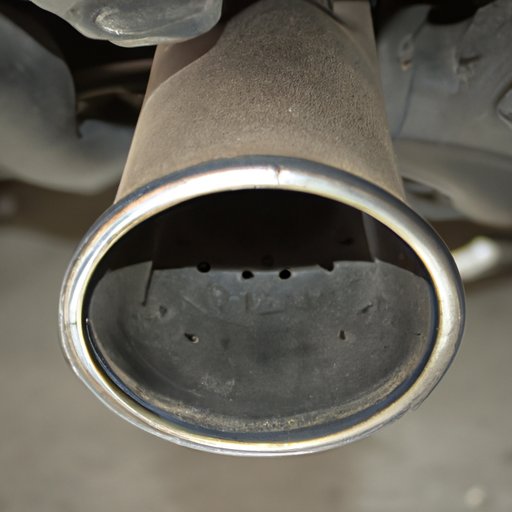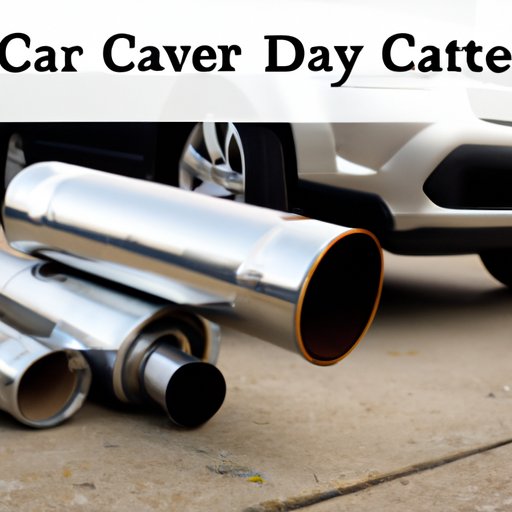Introduction
A catalytic converter is an essential part of a vehicle’s emission control system. It helps reduce harmful emissions from a car’s exhaust system, making it one of the most important parts of a car. Replacing a catalytic converter can be a costly endeavor, so it’s important to understand the various factors that can affect the cost and what you should expect when replacing it.
The Average Price of a Catalytic Converter and What it Includes
The average price for a catalytic converter replacement is between $1,150 and $2,250. This cost includes the parts and labor needed to replace the catalytic converter. The cost of the parts alone can range from $50 to $2,000 depending on the type of car and the quality of the replacement part.
Labor costs will vary depending on the make and model of car as well as the location of the catalytic converter. Typically, labor costs will range from $100 to $500. Some additional costs may include diagnostic fees, shop supplies, taxes, and other miscellaneous fees.
Factors That Impact the Cost of Replacing a Catalytic Converter
There are several factors that can affect the cost of replacing a catalytic converter. The type of vehicle is one of the biggest factors. For example, luxury cars often have more complex exhaust systems and require more expensive parts and labor. The condition of the car’s exhaust system can also factor into the cost, as any damage to the system can increase the labor costs.
The location of the catalytic converter can also affect the cost. If the catalytic converter is located in a hard-to-reach area, it may require more labor to access it. Additionally, the quality of the replacement part can also impact the overall cost. Higher quality parts tend to be more expensive but may last longer.
When is it Time to Replace Your Car’s Catalytic Converter?
It is important to keep an eye out for warning signs of a failing catalytic converter. These signs may include a decrease in engine performance, increased exhaust emissions, and a strong smell of sulfur coming from the car’s exhaust. If any of these symptoms are present, it is important to take the car to a mechanic for further inspection.
In addition to looking for warning signs, it is also important to test the catalytic converter. This can be done with a special scanner tool or a dyno test. Both of these tests will allow the mechanic to determine if the catalytic converter needs to be replaced.

Alternatives to Replacing a Catalytic Converter
In some cases, it may be possible to clean or repair the existing catalytic converter rather than replacing it altogether. This is usually only possible if the converter is not severely damaged or clogged. Additionally, there are aftermarket catalytic converters available that may be less expensive than OEM parts.

How to Get the Most Out of Your Catalytic Converter Replacement
When replacing a catalytic converter, it is important to shop around for the best prices. Different shops may offer different prices for the same job, so it is worthwhile to compare prices and look for deals. Additionally, it is important to look into warranties and guarantees that may come with the replacement part.

Understanding the Cost Benefits of a Catalytic Converter Replacement
Although replacing a catalytic converter may be expensive, there are some cost benefits associated with it. One of the biggest benefits is improved fuel economy. A properly functioning catalytic converter allows the car to burn fuel more efficiently, reducing fuel consumption. Additionally, a new catalytic converter can help reduce emissions, making it better for the environment.
Finally, replacing a catalytic converter can also help extend the lifespan of the car. A failing catalytic converter can cause significant damage to the car’s engine and exhaust system, which could lead to more expensive repairs down the line. By replacing the converter, you can avoid these costly repairs and keep your car running smoothly.
Conclusion
Replacing a catalytic converter can be an expensive endeavor, but it can also provide many cost benefits in the long run. By understanding the various components that make up the cost, as well as the factors that can impact the cost, you can make sure you get the most out of your replacement. Shopping around for the best prices and looking into warranties and guarantees can also help you save money on the replacement.
Overall, replacing a catalytic converter can help improve fuel economy, reduce emissions, and extend the lifespan of the car. While the upfront cost may be high, the cost benefits in the long run make it a worthwhile investment.
(Note: Is this article not meeting your expectations? Do you have knowledge or insights to share? Unlock new opportunities and expand your reach by joining our authors team. Click Registration to join us and share your expertise with our readers.)
